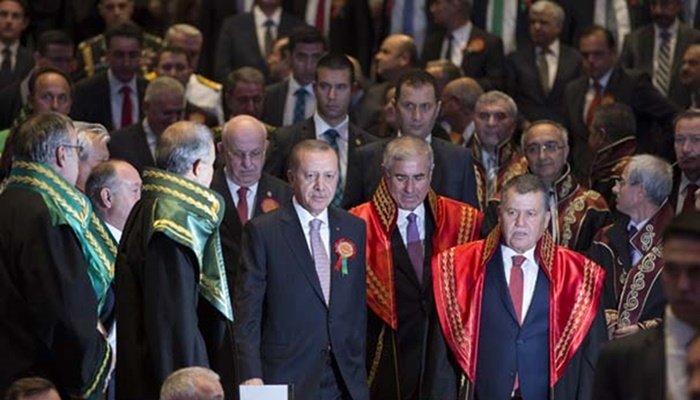A report by Turkey’s National Intelligence Organization (MİT) on corruption in the Turkish judiciary was presented to President Recep Tayyip Erdoğan prior to an exposé by the İstanbul chief public prosecutor about bribery, nepotism and other irregularities in the country’s judicial system, according to a special report by the T24 news website.
Turkey’s judiciary was already criticized by international bodies and rights groups for taking orders from the executive branch prior to the allegations of corruption.
Turkey disbarred more than 4,000 judges and prosecutors immediately after an abortive military coup in July 2016 over alleged ties to the faith-based Gülen movement, which it accused of orchestrating the attempted putsch. The movement denies any involvement.
The mass disbarment of members of the judiciary is believed by many to have had a chilling effect on the entire justice system, intimidating the remaining judges and prosecutors into doing the government’s bidding by launching politically motivated investigations into critics.
However, the allegations of corruption in the judiciary, first exposed by mafia figures such as Sedat Peker and Muhammed Yakut, go beyond the realm of political decision-making and paint a picture of a system that thrives solely on bribery.
İstanbul Chief Public Prosecutor İsmail Uçar has come forward with a letter sent to the Council of Judges and Prosecutors (HSK) exposing corruption in the country’s judicial system.
In the letter sent to the office of the HSK’s secretary-general on Oct. 6, Uçar detailed allegations of bribery, nepotism and other irregularities within the judicial system. The letter also included accusations against Bekir Altun, president of the İstanbul Judicial Commission.
According to Tolga Şardan of T24, the MİT report predates Uçar’s letter by six weeks and scrutinizes judges and prosecutors who have made questionable decisions in the last six years, particularly in İstanbul and Ankara.
The report identifies connections between lawyers, judges and prosecutors, focusing on hundreds of case files.
The MİT report highlights the Bakırköy Courthouse in İstanbul, stating that individuals under investigation for drug trafficking are allegedly moving their residences and businesses to this jurisdiction to benefit from lenient decisions acquired through bribes.
It also identifies judges and prosecutors who have made questionable bail and detention decisions, often in exchange for money.
The report comes at a time when allegations of corruption within the judiciary have reached an all-time high, which, according to Şardan, prompted MİT to take action.
President Erdoğan has already held meetings with MİT officials to discuss the findings, according to Şardan, who claims that the report could lead to significant changes in the judiciary, including possible reassignments.
Prosecutor’s exposé
“Unfortunately, with great regret, we have observed that … some members of the judiciary have begun to justify all sorts of dirty work as if they were owed something by the state,” Uçar said in his letter to the HSK, emphasizing a need for applying “chemotherapy,” if necessary, to eradicate the “cancerous cells” within the judiciary.
He alleged that decisions were made by İstanbul’s criminal courts of peace at the Anadolu Courthouse to block access to internet content and to release suspects in exchange for money.
Uçar called on the HSK to take necessary action against groups in the judiciary that “condone such heinous evil as drugs, release organization leaders without even putting them on trial, create an empire of fear and subject our colleagues to mobbing and attempt to influence trials.”
One of the prosecutors involved in closing corruption investigations in late 2013, Uçar was initially appointed as the deputy chief public prosecutor in İstanbul. Later, in 2017, he appeared to be rewarded by his appointment as İstanbul chief public prosecutor.
The December 17-25 bribery and corruption investigations shook the country back in 2013. The probe implicated, among others, the family members of four cabinet ministers as well as the children of then-prime minister and current president Erdoğan.
As part of the first investigation, the sons of three then-ministers from the ruling Justice and Development Party (AKP) were detained on Dec. 17, 2013.
A week later another investigation reached Erdoğan’s son Bilal Erdoğan.
The Dec. 17-25 investigations led to the resignation of four Cabinet ministers, to which Erdoğan responded by claiming that the corruption scandal was fabricated by sympathizers of the Gülen movement, inspired by the views of Islamic cleric Fethullah Gülen, within the police department with the aim of overthrowing his government.
Since then, hundreds of police officers and members of the judiciary have been detained and some arrested for alleged illegal activity in the course of the corruption investigations.
The Turkish government accuses the Gülen movement of masterminding the failed coup on July 15, 2016 and labels it as a terrorist organization. Gülen and his movement strongly deny any involvement in the failed putsch and any terrorist activity.

